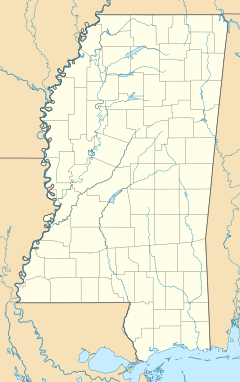Bigbee Valley, Mississippi facts for kids
Quick facts for kids
Bigbee Valley
|
|
|---|---|
| Country | United States |
| State | Mississippi |
| County | Noxubee |
| Elevation | 157 ft (48 m) |
| Time zone | UTC-6 (Central (CST)) |
| • Summer (DST) | UTC-5 (CDT) |
| GNIS feature ID | 667158 |
Bigbee Valley is a small, quiet community in Noxubee County, Mississippi, United States. It is known as an unincorporated community. This means it's a place with a shared identity but without its own local government, like a city or town. Other names for this area include "Bigbeevale", "Nances Mill", and "Whitehall".
Contents
Where is Bigbee Valley Located?
Bigbee Valley is found in the eastern part of Mississippi. It sits about 2.4 miles (3.9 km) west of the border with Alabama.
Rivers and Waterways
Historically, Bigbee Valley was very close to the west bank of the Tombigbee River. This river is important for transportation and trade.
The Tennessee–Tombigbee Waterway
In 1984, a big project called the Tennessee–Tombigbee Waterway was finished. This project created a new path for boats. It moved the main part of the waterway about 4.0 miles (6.4 km) to the east. This change affected how the river flows near Bigbee Valley.
What's in a Name?
The name "Bigbee Valley" comes from the last two syllables of "Tombigbee". The word "Tombigbee" has its roots in the Choctaw language. The Choctaw people are a Native American tribe.
A Glimpse into History
Bigbee Valley has a long history. A post office was first opened here in 1858. This helped people send and receive mail.
Life in 1900
By the year 1900, Bigbee Valley was a busy little community. It had a population of 75 people.
Local Industries
The community was home to several important businesses:
- A grist mill: This was used to grind grain into flour.
- A steam saw mill: This mill used steam power to cut logs into lumber.
- Cotton gins: These machines separated cotton fibers from their seeds. Cotton was a very important crop in the region.
These businesses helped the community grow and thrive in the past.
 | Toni Morrison |
 | Barack Obama |
 | Martin Luther King Jr. |
 | Ralph Bunche |


